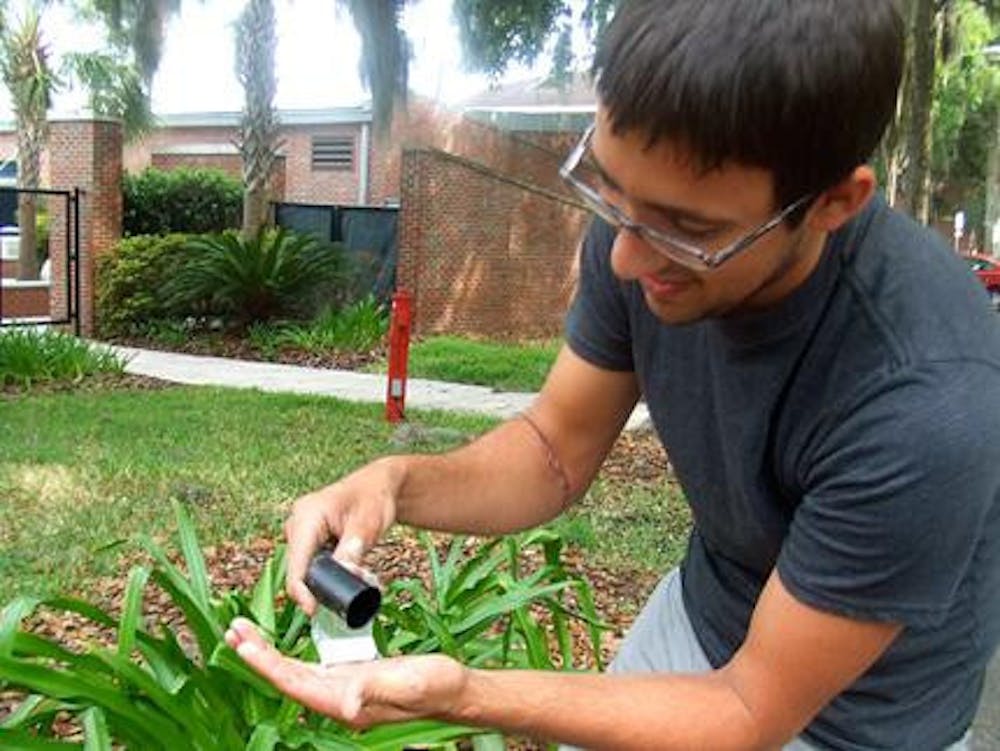Eyes darting, his fast pace gets faster. He's mumbling. It's around here somewhere, within 12 feet or so, he says. Check under the rock. Check in the dirt. Check the coordinates. Check the rock again.
"Found it!"
With his nearly $250 hand-held global positioning system, UF student Will Dueease uncovered the hidden treasure. It was lodged in a rock near the UF law school.
The treasure itself wasn't much - a tiny metallic monkey pendant and a long list of names inside a photo film canister. But the prize isn't really the point. After signing his name below the tens of others who came before him, Dueease put the canister back.
It's a search for the sake of searching.
A couple of times a week, when he gets bored, or when it's a nice day or when he feels like exploring a new place, Dueease goes on one of these high-tech hunts, dubbed "geocaches."
He starts online, where others log the coordinates of treasures they hide, along with clues or sometimes cash prizes for the first finder.
Then Dueease plugs the location into his GPS system and hits the streets. According to www.geocaching.com, the self-proclaimed official cache site and the one Dueease uses, the activity began in 2000 when former President Bill Clinton discontinued an act that forced satellites to weaken their signals. The weakening was meant to beef up national security, but Clinton's administration found that it had minimal results.
Because of that decision, GPS systems were able to pinpoint specific locations more accurately, and geocaching was born.
Its name is a combination of "geo," meaning "geography," and "cache," a French word for "hiding place," the site states.
There are now more than 780,000 active geocaches around the world, according to the site. That's up from about 75 when the site started keeping track in 2000. About two million to three million people are in on the game.
"There's no goal," Dueease said, pausing to take a sip from his Camelbak, a water-dispensing backpack, one recent geocaching afternoon. "People just do it because, well, it's fun. It's goofy."
UF grounds superintendent Marty Werts said his employees find strange items on campus "all the time," but he can't recall anybody finding film canisters holding odds and ends or little lists of names.
Still, they're out there. Dueease guesses there are now about 30 caches on campus and thousands of others in the Gainesville area.
According to online maps, there are also caches waiting in France, Italy, Antarctica, Laos, Zimbabwe and pretty much anywhere in between.
Dueease knows firsthand.
On a recent vacation to California, he and his dad, Bill Dueease, found a cache hidden on the Golden Gate Bridge. Near the big, white Hollywood sign, they found a special coin with a serial number to track its location online. It had traveled all the way from South Carolina.
"That little sucker had been around," the elder Dueease said in a phone interview.
Dueease owns a life-coaching business in Fort Lauderdale called The Coach Connection. When his son first told him about geocaching, he recalled thinking, "What the heck? Why would anybody want to leave something out in the middle of nowhere?"
He changed his mind after giving it a try. Besides the quality time with his son, Dueease said the best part of geocaching is the teamwork.
"It's a blast. It's an adventure, you know?"
Shauna Maggs, spokeswoman for Groundspeak, the company that operates the geocaching site, saidcaches should never be buried, in interest of preserving natural habitats.
"They should be containers hidden in plain sight," she said.
The United States is now the most popular location for geocaching. Other top spots include the United Kingdom, Germany, the Czech Republic and Canada.
"It's a good way to know a new place," Maggs said. "It's never about what's found. It's more about the experience of the journey."
Will Dueease agrees.
He now explores places he's never been and appreciates Florida's outdoors. There's the adventure part, too, and feeling like he's part of "a weird club or something."
Of course, there are times when he doesn't find what he came for. Wind and rain can dislodge caches, or non-geocachers, known as "muggles," could find and take the prize without knowing any better.
"It kind of sucks," Dueease said of an unfruitful search. "You're like, 'Awww, was it really there, or did it get vandalized, or do I just suck at finding them, or is it a combination of the three?'"
But he said the majority of hunts end happily.
After finding the little metal monkey at the Alfred A. Ring Tennis Complex, a hunt named "Lord of the Ring" by whoever set it up, Dueease positioned his GPS for another cache. This one was called "By Bike or by Hike" and led him to an overgrown trail near Fraternity Row. Swatting away mosquitoes and untangling himself from spider webs, Dueease failed to notice the poison ivy brushing his ankles.
"I guess that's the danger of this game," he said, chuckling.
Finally, from behind the stump of a big dead tree, Dueease hoisted a gallon-sized black canister from the dirt. "Sweet!"
Inside the jug, he found a plastic toy cow, a frequent-buyer punch card for a restaurant he hadn't heard of, a pink drink coozie and a little blue notebook. He scrawled a signature and date below the last log, someone who'd been there a month before. Dueease always hunts with friends but thinks it'd be cool to run into one of those mysterious fellow searchers. Then again, maybe not.
Dueease admits that marching around campus with his GPS and rooting under rocks for hidden treasure is "moderately embarrassing."
"No girls are like, 'Wow, that's really hot,' and I can't really go to a club and impress people with my geocaching skills," Dueease said. "It's nerdy, is it not? This is so lame."
A glance down at the GPS. The arrow's pointing that-a-way. Dueease smiles.
"Aw, I love it."






